Long-Term Stress and Systemic Failure
Taking Seriously the Fiscal Crisis of America’s Older Cities
Published: September 2011
Geography: United States
Author(s): Center for Community Progress
America’s legacy cities — older cities that have lost much of their historic population and job base — are in a severe fiscal crisis. Facing growing defecits, they are reducing services, laying off municipal employees, canceling capital projects, and cutting back on repair and meintenance of city facilities and infrastructure. While every recession creates fiscal difficulties for local governments, this one has hit older, poorer cities with particular intensity.
A fundamentally new approach to addressing fiscal stress in legacy cities is needed, which focuses not only on short-term cash flow but which is designed from the beginning to foster long-term change in these cities’ fiscal reality, to end the vicious cycle of decline. This means taking short-term actions while being careful not to impair the city’s long-term viability, while laying the groundowrk for long-term strategies to build the local economy, reuse underutilized or vacant land, and stabilize or grow the local population.
This report – written for America’s older cities, but with lessons for all cities that face fiscal stress – suggests a new approach to end the cycle of decline that has entrapped many municipalities. Long-Term Stress and Systemic Failure recognizes the challenges and offers policymakers and officeholders real long-term solutions to build the local economy, reuse underutilized or vacant land, and stabilize or grow the local populations, and generate long-term economic sustainability.
Subscribe to join 14,000 community development leaders getting the latest resources from top experts on vacant property revitalization.

